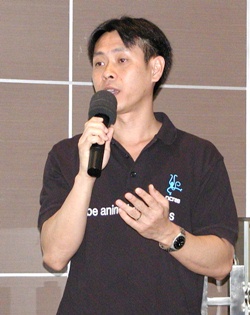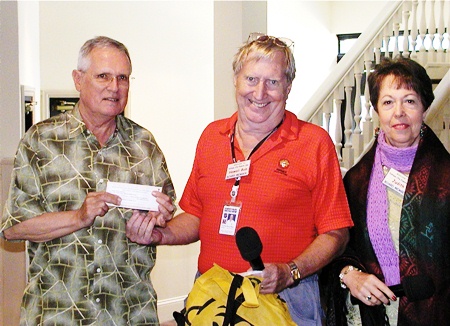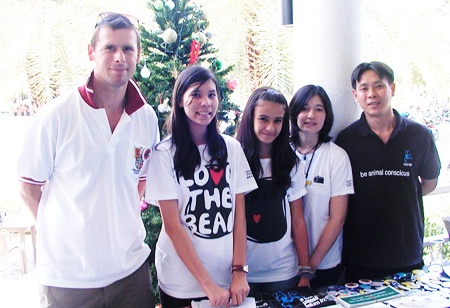Master of Ceremonies Richard Silverberg welcomed everyone to the Sunday, December 19th meeting of the Pattaya City Expats Club. He called on Francis Catalang, a student from the Regents School, to introduce guest speaker Louis Ng from Singapore. Louis is the founder and Executive Director of Animal Concerns Research and Education Society (ACRES). Louis received his Bachelor of Science in Biology from National University of Singapore and in 2004 he received his Masters in Primate Conservation from Oxford Brookes University, UK.
Louis started by displaying some pictures when he opened his remarks with “Do animals have rights?” One picture depicted a rabbit used in experimentations and the other was a video clip showing a bear from the Singapore Zoo continuously running in circles.
 Pattaya City Expats were fortunate to have Singaporean Louis Ng, founder and Executive Director of Animal Concerns Research and Education Society (ACRES) talk to us about animal rights, and preventing abuse of animals.
Pattaya City Expats were fortunate to have Singaporean Louis Ng, founder and Executive Director of Animal Concerns Research and Education Society (ACRES) talk to us about animal rights, and preventing abuse of animals.
He mentioned that the work of Acres was in the areas of improving captive animal welfare, undercover investigations into illegal wildlife trade, wildlife rescue work and raising public awareness on animal welfare. He said that people should understand that animals are smart and can suffer. He cited several examples including chimps that can actually communicate through sign language and mentioned other animals that are known to have some ability to communicate.
He said he first got interested in animal welfare when he was a young boy when he saw the movie Gorillas in the Mist; the story of Dian Fossey, a scientist who went to Africa to study the vanishing mountain gorillas and fought to protect them.
With the aid of pictures and video, Louis described the need for concern over the welfare of animals, which can be the conditions at zoos where animals are kept, animal shows where they are used for entertainment, or their use in experimentation for beauty and other products.
Also, animals such as bears and tigers are inhumanely treated and harvested for their body parts in making traditional Chinese medicines. He said that the bad treatment of animals is not necessarily the result of intentional cruelty, but happens mostly through ignorance. Although his group has taken positive action, it takes more than that. He said it takes community awareness of the plight of these animals to change the public’s acceptance of what happens to them.
 Member Joseph wins a free dinner ticket organised by Hawaii Bob. Judith had heard Heathrow was closed by a blizzard …
Member Joseph wins a free dinner ticket organised by Hawaii Bob. Judith had heard Heathrow was closed by a blizzard …
He said he would primarily focus on a few of these areas. The first was bear farms where horrific and inhumane methods of bile extraction have been developed by the bear farming industry. All of them cause severe mental and physical trauma to the captive bears. Louis showed pictures of how the bears are kept in small cages for years so that their bile can be collected and used in making traditional Chinese medicines. He said that many of the bears go mad and can be seen repeatedly beating their heads against their cage bars.
He then pointed out the plight of animals being used for entertainment. These, too, are often kept in small cages between performances that are not suited for them, and the trade in exotic animals that is illegal, but still being done.
He mentioned several actions ACRES has taken in Singapore to reduce the number of shops selling traditional Chinese medicine that use bear and tiger parts. The ACRES Wildlife Rescue Team has also rescued more than 740 wild animals in Singapore since August 2009. They have also conducted surveys of zoos in Malaysia and Thailand. This effort includes forming a partnership with various authorities to work together to eradicate poor animal welfare conditions in these zoos.
Louis concluded by mentioning the ACRES Wildlife Rescue Centre. He showed pictures of the Centre noting the types of animals they care for and how they are treated. Louis said that as far as possible, animals rescued from the illegal wildlife trade are being repatriated to their country of origin, whilst native animals are rehabilitated and released back to the wild. They also have an Education Centre that offers several programs for visitors to gain a better understanding of the plight of animals and how they can help.
 Louis with teacher Paul Crouch and students of the Round Square project, Regents School, Pattaya, who organised Louis’s trip to Thailand.
Louis with teacher Paul Crouch and students of the Round Square project, Regents School, Pattaya, who organised Louis’s trip to Thailand.
Louis answered many questions about ACRES and his work. For those that are interested in more information on their work, they can visit the ACRES website at http://www.acres.org.sg/
Richard Silverberg then updated everyone on upcoming events and called on Judith Edmonds to conduct the always informative and sometimes humorous Open Forum, where questions about living in Thailand and Pattaya in particular are asked and answered.




